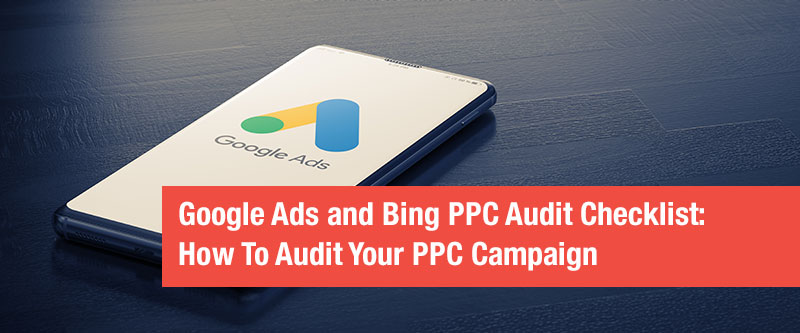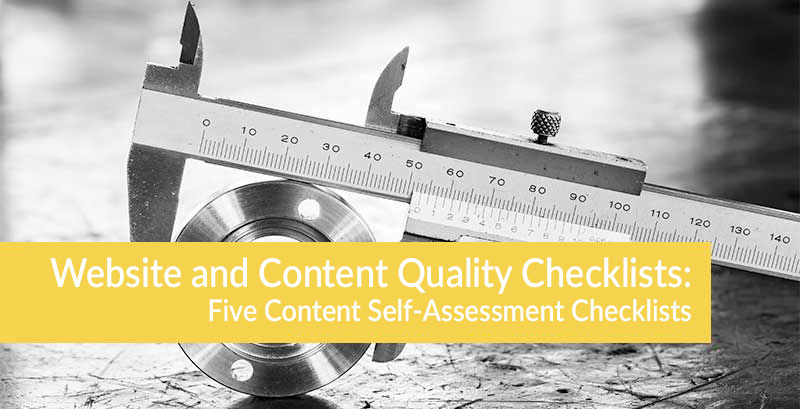A PPC Audit Checklist and Guide to PPC Best Practices
A PPC audit gives you actionable feedback you can use to strengthen your PPC campaign. An audit tells you in black and white, what is working, what can be improved, and what needs to be changed immediately.
Your Google and Bing PPC campaigns are too important to leave to chance.
Regularly auditing your PPC campaigns is the easiest way you have to catch errors, find overlooked opportunities, and to capitalize in changing search intent and demographics. Small but important details like spelling, message consistency, keyword overlap, and mobile-friendly landing pages add up to large impacts on your PPC campaign efficacy.
Our seven step PPC audit process is designed to help you improve your Google and Bing PPC campaigns.
1. Know Your PPC Goals
Your PPC campaigns need to be aligned with your business and account goals. Knowing why you’re running a PPC campaign should drive your PPC strategy.
Everything from the keywords, landing page structure, messaging, budget, and campaign structure are tied to your account and business goals. If you don’t know this information or it’s not clear, take a step back and get this defined. Then you can move forward with a PPC campaign that converts and clicks.
PPC Audit Campaign Goals Checklist:
- Review your conversion goals for Google and Bing.
- Know the business and account goals.
- Review your target personas and demographic.
- Research search intent and understand how it connects to your goals.
- Know how you will track PPC campaign success.
- Create a PPC audit schedule.
- Define your metrics.
2. Review Your PPC Campaign Structure and Settings
Your PPC campaign structure and settings play a huge factor in the success of your PPC strategy. It’s key you know why your campaign is structured the way it is.
Do you know why your campaign and ad groups are structured around persona targets or product lines instead of around business goals or subject matter? There is no right or wrong way to structure you campaigns, but you want to use a strategy that gives you control over all details from the high-level to the granular.
PPC Audit Campaign Structure and Settings Checklist:
- The campaign is relevant and targeted, ensuring you’re getting a 5-10% conversion rate.
- Monitor daily spend to make sure you’re not spending too much or too little.
- Know what a good lead means for the campaign.
- Make sure budget is allocated to campaigns that matter most to you (or your client).
- Pay attention to the data and use this to inform the PPC structure.
- Communicate monthly with your client, sales team, or manager to review the quality of your PPC campaign leads.
- Regularly quantify how individual campaigns, groups, and keywords drive business. Remember to drill down into dimensions like the time of day.
- Use demographic data in your analysis instead of treating everything the same.
- Find and test new ad formats at least once a quarter.
- Review geographic, device, and persona targets.
- Monitor the bid strategy, budget, and ad delivery.
- Analyze Google extensions.
3. Keyword Research
The right keywords drive the success of your PPC campaigns. Just like knowing search intent and your target personas, you need to know the why, what, when, where, and how behind your keywords.
However, it is very easy to get bogged down in the details of keywords and spend too much time overthinking negative keywords, match type, competitor keywords, and search intent.
Start with identifying 1-5 relevant keywords for each ad group that are aligned with ad theme and goals. Regularly review these keywords and adjust them as you learn what does and doesn’t work.
PPC Audit Keyword Research Checklist:
- Narrow targeting for specific keywords, ads, and landing pages.
- Find and stop using low-performing keywords. This includes keywords that haven’t converted for six months or longer.
- Investigate your negative keywords – make sure you’re using them correctly.
- Review and reduce CPA to improve lead quality.
- Regularly find and test new keywords.
- Review ad group keywords to ensure you’re using small and tight themes.
- Start using rules/statistical rigor in your testing instead of guessing.
- Remove all keyword overlap.
- Double-check that you’re not bidding against yourself.
- Align keywords with conversion goals.
- Use your keywords to build campaign themes, ad groups, and messaging.
- Choose the right keyword match types.
- Aim for 10 keywords or less for each ad group.
4. PPC Ad Review
The right keywords get your ad noticed. But it’s what your ad says and how it’s said that gets the clicks and conversions. Do not rush your ad copy or assume it works. Make A/B testing a priority and don’t be afraid to rethink your ad language and messaging.
Make sure every aspect of your ad, including the URL, headline, description, and ad copy speak to the reader.
PPC Ad Review Checklist:
- Make sure there is alignment between keywords, ad copy, and landing pages.
- Address search intent and uses the right campaign keywords.
- Include an enticing CTA that tells the reader what you want them to do.
- Use A/B testing to evaluate ad copy.
- Only testing two different ads in each ad group.
- Review all grammar, spelling, and wording.
- Make sure all ads are optimized for conversions.
- Ads are leveraging regular display.
- Test new offers at least once a quarter.
5. PPC Landing Page Review
A good first impression goes a long way. Think of your landing pages as the first impression people get when they click your PPC ad. Your landing page needs to work quickly to convert and drive sales.
It’s important there is a consistent look-and-feel and messaging between your PPC ads and landing pages. Remember people have very little patience for ambiguity and only skim your landing page content before making a decision.
PPC Landing Page Review Checklist:
- Make sure your PPC ads and landing pages are consistent.
- Landing page is correlated with the keyword, ad, and search intent.
- Mobile friendly landing page.
- Test landing pages on a monthly basis.
- Create landing pages for specific and related keywords.
- Gives readers all the information required to make a buying decision.
- Includes an up-to-date and clear product photo, description, pricing, product options, and product reviews.
- Makes it easy for people to click Buy.
- Clear and correct contact information.
- Triggers an order confirmation and thank you email with details such as the tracking number, return policy, contact information, and expected ship date.
- Use A/B testing for landing page copy and design.
6. PPC Tracking and Testing Review
PPC tracking and testing give tell you what is and isn’t working. While you should be integrating testing through-out your PPC audit, it is a step many people overlook.
Tracking conversions and correlating these to your ad and landing page test data tells you how to manage your PPC campaign to keep it working for you.
If you’re not tracking and testing – you don’t know what is working and what needs to change.
Read these Google and Bing articles about PPC tracking and testing:
PCC Tracking and Testing Checklist:
- Ensure AdWords is correctly integrated with Google Analytics.
- Review test types – make sure you’re running high-impact tests.
- Track all relevant conversions and calls in alignment with your Google Analytics goals.
- Pause all poor-performing keywords.
- Triple check conversions.
- Verify tracking at least once a quarter.
- Implement simultaneous A/B testing for all ads and landing pages.
- Monitor these metrics:
- Click Through Rate
- Cost Per Click
- Conversions and Conversion Rate
- Cost Per Acquisition
- Quality Score
7. PPC Script Auditing
PPC auditing often falls off the radar because you’re busy. You know you need to do this, but you don’t have the time or resources.
This is where PPC scripts are useful. You can write or use existing scripts to audit every detail of your PPC campaign and to execute tasks based on the audit results. Yes, this sounds confusing, but it really isn’t.
In fact, it’s likely someone has already written a PPC audit script for the tasks you want to automate.
PPC Auditing Scripts Checklist:
- Read the following articles and follow the advice about scripts and automation:
PPC auditing should not be time consuming or stressful. Create a practice of regular and consistent auditing so you can catch problems and opportunities before it’s too late.
Call us to talk about PPC auditing and your Google and Bing PPC campaigns. We are here to help you.
About the author
Kevin Hawke is the COO/Partner at Know Agency. As the COO at Know Agency, Kevin uses his 20 plus years of digital marketing experience to deliver success to our clients. Prior to working with Know Agency’s list of industry-leading clients, Kevin worked with a variety of brands – including AT&T, General Motors and Campbell Soup. In addition to leading key projects, Kevin uses his technical experience to provide a finely tuned, nimble operating infrastructure. He takes pride in Know Agency’s ability to expand and contract quickly to meet client resourcing and budget needs. Kevin started as a technologist and thrives on solving technical challenges and delivering results for our clients.



